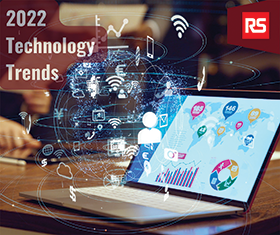

As we embark on a new year, it is fascinating to acknowledge the leaps and bounds made in technology over the course of 2022. Spearheaded by sustainability, big data analysis needs, privacy concerns, connectivity, security considerations, and global communication needs, there have been undeniable advances in both hardware and software development throughout the year.
Even though there were limitations brought about by the global pandemic that slowed down many technological projects, many innovative technologies emerged. Companies globally have become more open-minded, adapting to the new ‘normal’ and new ways of working, while upgrading technologies to help manage outputs. Last year also saw the switch to remote and hybrid working, which also motivated some of the progress in the tech world.
RS South Africa also adopted many new technologies and hybrid work models to ensure that little to no business disruption occurred, and since the pandemic the business has implemented new technologies to ensure that downtime is a thing of the past. In this ever-changing business environment, especially when many of RS’s customers rely on its ability to service them without any delays, being abreast of the latest technological trends keeps the company ready for most challenges. Below are some of the most notable trends in technology observed in 2022.
5G technology
According to Ericsson’s Mobility Report published by Statista Research early last year, 5G technology subscriptions will surpass one billion this year. 5G has boosted IIoT, which involves internet-powered smart devices linking and operating together. Unlike 4G, many devices can connect to the 5G network without a significant drop in speed, latency, and reliability. In South Africa, three out of country’s five major cellular operators have 5G networks and are rapidly growing their coverage.
Artificial intelligence and machine learning
Artificial intelligence (AI) is one of the most consistently evolving technologies in the world. It has the potential to provide solutions across many industries, from health, security and education to logistics and information technology. Its most notable strength is its ability to analyse big data and provide reports that can be used by organisations to develop strategies and solutions. Other uses for AI include automation in manufacturing, guiding self-driving cars, and operating as smart online assistants such as Siri or Google.
Clean technology (cleantech)
Clean technology has emerged in response to the desire for sustainable living, and this is influencing the development of new technologies known as clean technologies − or cleantech. Cleantech reduces the environmental impact of products or services, while optimising the use of natural resources. Renewable energy has been the most notable attempt at developing sustainable technologies, with wind, hydroelectric, and solar power having a lower carbon footprint than fossil fuels. This is true for South Africa as many businesses and households have adopted alternative energy in response to the energy crisis. Currently, the top cleantech trends include rechargeable batteries, electric vehicles and motors, solar panel development, biofuel-powered turbo generators, and waste management technologies.
AI-powered cybersecurity
The steady increase in cyberattacks, email phishing scams and ransomware is forcing cybersecurity firms to search for tech solutions to address the current issues. Criminal masterminds are hacking individuals’ accounts, countries’ critical infrastructure, and businesses of all sizes, causing millions, if not billions, in losses. Workplace digitisation and remote working in response to the Covid-19 virus made it a priority to retrain employees on online safety to reduce data breaches and losses.
Internet of Behaviours (IoB)
Perhaps one of the more controversial trends in tech over 2022 is IoB. A lot of customer and consumer data is collected by service providers through IoT devices in the home. Businesses are using analytics and big data techniques to determine the data’s value in what is now known as the Internet of Behaviours (IoB). By reviewing this customer information, businesses can personalise their services, market their products, and improve a customer’s experience with the company.
Brian Andrew, managing director at RS South Africa said that the Covid-19 pandemic had a major impact on the evolution of technology over the past two years. “We at RS have seen a major uptake in our IoT devices, ranging from sensors to connected devices. We have also noticed that businesses have become more conscious of the ever-evolving impact of embracing tech at all levels,” he said, adding that we must find a balance between developing innovative new technologies and regulating them to protect privacy and security. “We can be sure that the impact of technological advancements will spearhead even more exciting tech in 2023,” he concluded.
| Tel: | +27 11 691 9300 |
| Email: | [email protected] |
| www: | www.rs-online.co.za |
| Articles: | More information and articles about RS South Africa |

© Technews Publishing (Pty) Ltd | All Rights Reserved